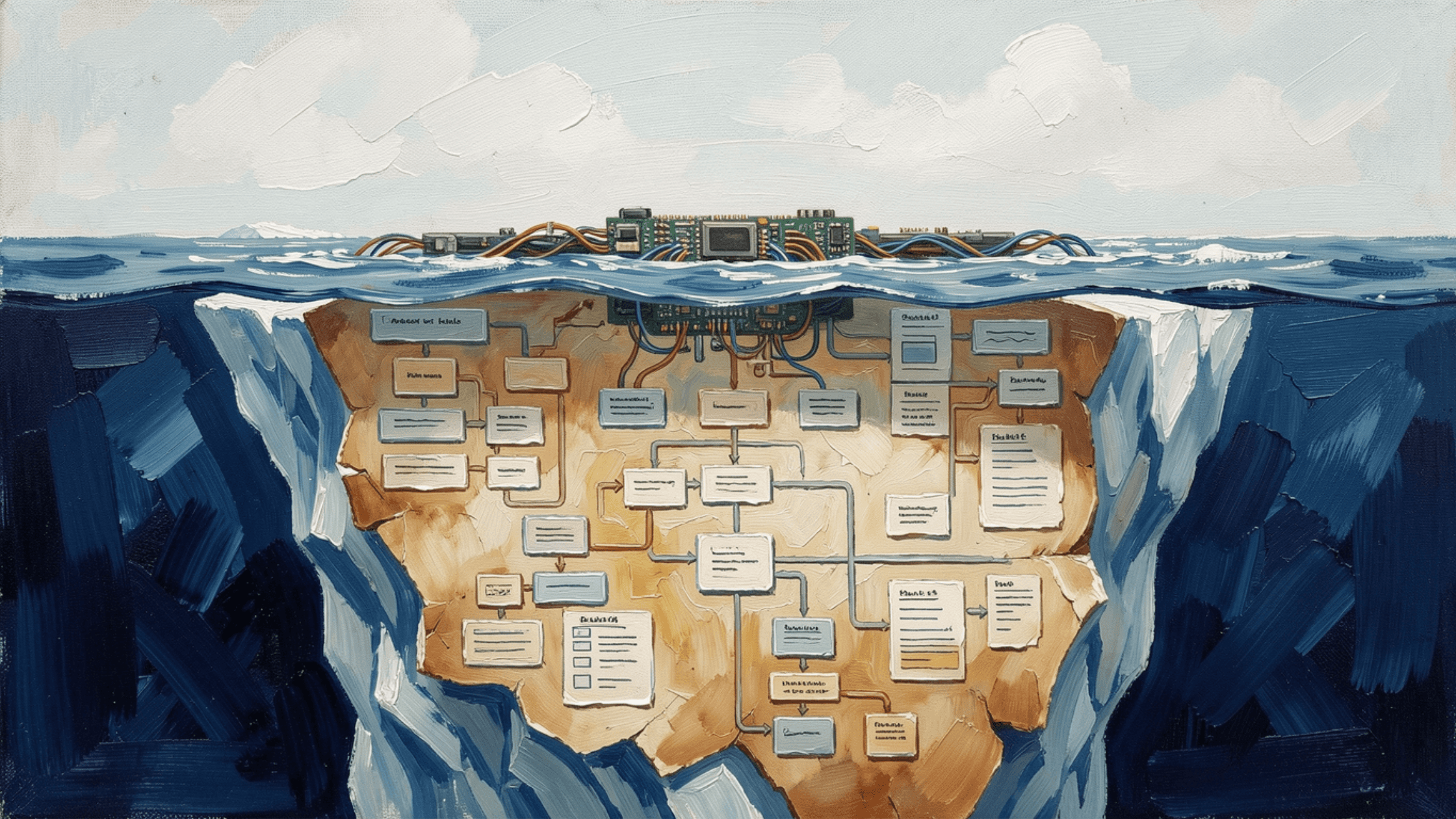30 oct 2025
2 min leer
Atlas Browser de OpenAI: ¿Revolución o Pesadilla de Seguridad? Lo Que Los Líderes Empresariales Deben Saber

Vulnerabilidad importante descubierta días después del lanzamiento plantea preguntas críticas sobre la navegación impulsada por IA
El último lanzamiento de OpenAI tiene al mundo tecnológico en vilo y a los expertos en seguridad lanzando señales de alarma. El navegador ChatGPT Atlas, lanzado el 21 de octubre de 2025, promete revolucionar la navegación web con asistencia integrada de IA. Pero a pocos días de su lanzamiento, los investigadores descubrieron una vulnerabilidad crítica que podría exponer a los usuarios a inyecciones de código malicioso y ataques remotos.
Para los líderes empresariales que consideran la automatización con IA, Atlas representa tanto la promesa como el peligro de los sistemas de IA agenticos. Esto es lo que necesitas saber.
¿Qué es el Navegador Atlas de OpenAI?
Atlas no es solo otro navegador web: es el audaz intento de OpenAI de reinventar cómo interactuamos con Internet. Construido sobre Chromium (el mismo motor que impulsa Google Chrome), Atlas integra ChatGPT directamente en tu experiencia de navegación a través de tres características clave:
1. Barra Lateral de ChatGPT Siempre Activa
No más copiar y pegar entre pestañas. Atlas presenta un panel persistente de ChatGPT que puede:
Resumir cualquier página web al instante
Responder preguntas sobre el contenido de la página
Ayudar a escribir o editar texto directamente en formularios
Analizar datos y crear percepciones
2. Sistema de Memoria del Navegador
A diferencia de los navegadores tradicionales que olvidan el contexto de navegación, Atlas recuerda:
Los sitios web que has visitado y por qué
Temas de investigación que has explorado
Tareas que has comenzado pero no has terminado
Contexto de sesiones anteriores para hacer sugerencias más inteligentes
3. Modo Agente (El Cambio Radical)
Aquí es donde Atlas se vuelve controvertido. El Modo Agente permite a ChatGPT controlar realmente tu navegador:
Abre pestañas y navega por sitios web de manera autónoma
Rellena formularios y carritos de compras
Reserva citas y hace reservas
Lleva a cabo investigaciones en múltiples sitios
Compila información en informes
Imagina decirle a tu navegador: "Encuentra los mejores restaurantes en Dubái, verifica su disponibilidad para el sábado por la noche y reserva una mesa para cuatro." Atlas afirma que puede hacer exactamente eso.
La Revelación de Seguridad: Atlas Bajo Ataque
Solo una semana después del lanzamiento, los investigadores de seguridad en LayerX y NeuralTrust hicieron una revelación asombrosa: Atlas contiene vulnerabilidades críticas que podrían comprometer la seguridad del usuario.
La Flaw de Inyección de Prompt
Investigadores descubrieron que sitios web maliciosos pueden engañar a Atlas disfrazando comandos dañinos como URLs legítimas. Cuando Atlas encuentra estas URLs "envenenadas" en su barra de direcciones, las trata como comandos de usuario de alta confianza, potencialmente:
Ejecutando instrucciones maliciosas ocultas
Eludiendo controles de seguridad
Realizando acciones no autorizadas
Accediendo a datos sensibles del usuario
El Ataque de Envenenamiento de Memoria
Aún más preocupante, los atacantes pueden utilizar ataques de Cross-Site Request Forgery (CSRF) para inyectar instrucciones maliciosas directamente en el sistema de memoria de ChatGPT. Una vez comprometido:
Las instrucciones maliciosas persisten en todos los dispositivos
Cada interacción futura con ChatGPT puede activar acciones dañinas
El compromiso es extremadamente difícil de detectar y eliminar
El código generado puede contener puertas traseras ocultas
Estadísticas de Defensa Impactantes
Las pruebas de LayerX revelaron las debilidades de seguridad de Atlas:
Atlas bloquea solo el 5,8% de los intentos de phishing
Chrome y Edge bloquean entre el 47% y el 53% de los mismos ataques
Los usuarios de Atlas son un 90% más vulnerables a amenazas basadas en la web
El Director de Seguridad de Información de OpenAI reconoció los riesgos, afirmando que están "investigando y mitigando de manera muy reflexiva" los ataques de inyección de prompt, pero el daño ya podría estar hecho.
Por Qué Esto Importa para los Líderes Empresariales
Los problemas de seguridad de Atlas destacan un desafío crítico que enfrentan las empresas que adoptan la automatización con IA: la brecha entre las capacidades de la IA y la seguridad de la IA.
El Cálculo del Riesgo Empresarial
Promesa de Productividad: Atlas podría ahorrar a los empleados horas por semana en investigación, entrada de datos y tareas rutinarias en la web
Realidad de Seguridad: Las vulnerabilidades actuales podrían exponer redes corporativas a ataques sofisticados
Factor de Confianza: Si los usuarios no pueden confiar en su navegador, ¿cómo pueden confiar en agentes de IA con tareas críticas para el negocio?
Lecciones para la Estrategia de Automatización de IA
Fiabilidad de Producción No Garantizada: Incluso las principales compañías de IA pueden lanzar productos con serias fallas de seguridad
IA Siempre Activa = Riesgo Siempre Activo: Los sistemas de autenticación y memoria persistentes crean superficies de ataque más grandes
La Supervisión Humana es Crítica: El modo agente funciona, pero alguien necesita vigilar lo que está haciendo
El Panorama Competitivo: Atlas vs. El Campo
OpenAI no está solo en la carrera de navegadores IA:
Jugadores Actuales
Comet de Perplexity: Búsqueda IA con chat integrado
Dia de The Browser Company: Funciones de productividad potenciadas por IA
Modo Copilot de Microsoft Edge: Mejorado con asistencia IA
Modo IA de Google Chrome: Resúmenes de búsqueda IA incorporados
Diferenciadores de Atlas
Integración Más Profunda con ChatGPT: Construido alrededor de la IA, no simplemente añadido
Verdaderas Capacidades de Agente: Puede realizar tareas realmente, no solo sugerirlas
Memoria a Través de Sesiones: Recuerda el contexto a lo largo de sesiones de navegación
Disponible el Nivel Gratuito: Funciones básicas accesibles sin pago
Qué Significa Esto para el Futuro de la Automatización IA
Atlas representa un punto de inflexión crítico para la adopción de IA en empresas. Las capacidades del navegador demuestran lo que es posible cuando los agentes de IA tienen acceso amplio al sistema, pero las vulnerabilidades de seguridad muestran lo que puede salir mal.
El Desafío de la Producción IA
Atlas encarna el desafío central que enfrenta la automatización con IA en empresas: ¿Cómo construir agentes de IA lo suficientemente poderosos para ser útiles pero lo suficientemente seguros para ser confiables?
Para los líderes empresariales que evalúan plataformas de automatización IA, Atlas ofrece lecciones importantes:
Evaluar la Seguridad Primero: No solo preguntar "¿Qué puede hacer?", preguntar "¿Qué podría salir mal?"
Exigir Transparencia: Los proveedores deben explicar claramente sus medidas de seguridad y procedimientos de respuesta a incidentes
Planificar para las Vulnerabilidades: Asumir que se descubrirán problemas de seguridad y tener listos planes de respuesta
Empezar con Acceso Limitado: Probar agentes de IA en entornos aislados antes de darles acceso amplio al sistema
¿Deberías Usar Atlas? Un Análisis de Riesgos y Beneficios
El Caso a Favor de Atlas
Ganancias de Productividad: Los primeros usuarios informan de ahorros significativos de tiempo en investigación y tareas rutinarias
Ventaja de Innovación: Ventaja del primero en moverse en la navegación nativa de IA
Nivel Gratuito: Funciones básicas disponibles sin compromiso financiero
Iteración Rápida: OpenAI está lanzando actualizaciones y mejoras frecuentes
El Caso en Contra de Atlas
Riesgos de Seguridad: Las vulnerabilidades actuales podrían comprometer los datos y sistemas de los usuarios
Plataforma Inmadura: Menos de un mes de antigüedad, probablemente tenga problemas no descubiertos
Preocupaciones de Privacidad: Extensa recopilación de datos plantea preguntas de seguridad corporativa
Fiabilidad del Agente: El modo beta del agente puede cometer errores costosos
El Veredicto
Para las empresas: Esperar parches de seguridad y auditorías de seguridad independientes antes de su implementación.
Para los usuarios individuales: Considerar los riesgos vs. beneficios según sus requisitos de seguridad y sensibilidad de datos.
El Panorama Más Amplio: Agentes IA en Producción
El complicado lanzamiento de Atlas destaca una verdad más amplia sobre la automatización con IA: La brecha entre las capacidades de demostración y la fiabilidad de producción sigue siendo significativa.
Por Qué Esto Importa para la Estrategia de IA Empresarial
Prueba de Concepto ≠ Listo Para Producción: El hecho de que un agente de IA funcione en condiciones controladas no significa que esté listo para su uso empresarial
La Seguridad Debe Estar Incorporada: Los agentes de IA necesitan marcos de seguridad diseñados para sus riesgos únicos
Asociación Humano-IA: El futuro probablemente involucre asistencia de IA con supervisión humana, no automatización total
¿Qué Sigue para Atlas?
OpenAI está trabajando en soluciones para las vulnerabilidades descubiertas, pero el cronograma sigue sin estar claro. La compañía ha prometido:
Medidas de seguridad mejoradas para el modo agente
Mejoras en las defensas contra inyección de prompt
Mejor protección contra phishing
Soporte expandido para plataformas (Windows, iOS, Android próximamente)
Si Atlas puede superar sus desafíos de seguridad determinará si se convierte en el futuro de la navegación web o en una advertencia sobre apresurar productos de IA al mercado.
Conclusión
Atlas representa el futuro de las herramientas de productividad potenciadas por IA, con toda la promesa y el peligro que conlleva. Para los líderes empresariales, ofrece un vistazo de lo que eventualmente entregarán los agentes de IA: automatización genuina de tareas que ahorra tiempo y elimina trabajos tediosos.
Pero Atlas también demuestra por qué la fiabilidad de la producción IA importa más que las características de vanguardia. Hasta que se resuelvan los problemas de seguridad, las empresas deben acercarse a Atlas con cautela.
Las guerras de navegadores se están calentando, y la IA es el nuevo campo de batalla. Atlas ha dado el primer disparo, pero la pelea por una navegación potenciada por IA, segura y confiable, acaba de comenzar.
Descubra cómo los agentes de IA listos para producción pueden transformar sus operaciones sin los riesgos de seguridad.





